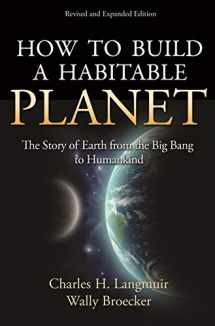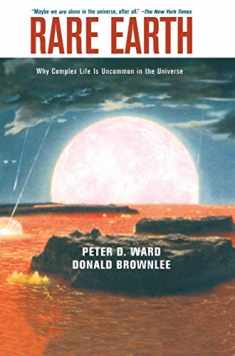
How to Build a Habitable Planet: The Story of Earth from the Big Bang to Humankind - Revised and Expanded Edition
Book details
Summary
Description
A classic introduction to the story of Earth's origin and evolution―revised and expanded for the twenty-first century
Since its first publication more than twenty-five years ago, How to Build a Habitable Planet has established a legendary reputation as an accessible yet scientifically impeccable introduction to the origin and evolution of Earth, from the Big Bang through the rise of human civilization. This classic account of how our habitable planet was assembled from the stuff of stars introduced readers to planetary, Earth, and climate science by way of a fascinating narrative. Now this great book has been made even better. Harvard geochemist Charles Langmuir has worked closely with the original author, Wally Broecker, one of the world's leading Earth scientists, to revise and expand the book for a new generation of readers for whom active planetary stewardship is becoming imperative.
Interweaving physics, astronomy, chemistry, geology, and biology, this sweeping account tells Earth’s complete story, from the synthesis of chemical elements in stars, to the formation of the Solar System, to the evolution of a habitable climate on Earth, to the origin of life and humankind. The book also addresses the search for other habitable worlds in the Milky Way and contemplates whether Earth will remain habitable as our influence on global climate grows. It concludes by considering the ways in which humankind can sustain Earth’s habitability and perhaps even participate in further planetary evolution.
Like no other book, How to Build a Habitable Planet provides an understanding of Earth in its broadest context, as well as a greater appreciation of its possibly rare ability to sustain life over geologic time.
Leading schools that have ordered, recommended for reading, or adopted this book for course use:
- Arizona State University
- Brooklyn College CUNY
- Columbia University
- Cornell University
- ETH Zurich
- Georgia Institute of Technology
- Harvard University
- Johns Hopkins University
- Luther College
- Northwestern University
- Ohio State University
- Oxford Brookes University
- Pan American University
- Rutgers University
- State University of New York at Binghamton
- Texas A&M University
- Trinity College Dublin
- University of Bristol
- University of California-Los Angeles
- University of Cambridge
- University Of Chicago
- University of Colorado at Boulder
- University of Glasgow
- University of Leicester
- University of Maine, Farmington
- University of Michigan
- University of North Carolina at Chapel Hill
- University of North Georgia
- University of Nottingham
- University of Oregon
- University of Oxford
- University of Portsmouth
- University of Southampton
- University of Ulster
- University of Victoria
- University of Wyoming
- Western Kentucky University
- Yale University


We would LOVE it if you could help us and other readers by reviewing the book
Book review




